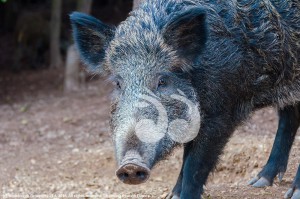Pig Disease Crosses the Range
 FIVE cases of Brucella suis infections have been diagnosed in pig hunting dogs in the Upper Hunter area during January.
FIVE cases of Brucella suis infections have been diagnosed in pig hunting dogs in the Upper Hunter area during January.
Four dogs became infected after hunting in the Blackville area and another dog became infected which had only hunted on the eastern side of the Liverpool Range.
Dr Jane Bennett, district veterinarian for Hunter local land services, said people who hunt wild pigs need to be vigilant and use proper infection control.
“The disease has certainly crossed the Range,” said Dr Bennett.
“You see a lot of kids and they are just covered in blood and they are just not aware of what can be involved with picking up diseases from a feral pig,” she said.
“They need to think about are they prepared to risk themselves and their dogs and their families?
“Because once the dog gets the disease the response to treatment in dogs has been very, very poor so the recommendation is for those dogs to be euthanased so that they can’t transfer it to another dog or people.
“It can also cause miscarriage in women, particularly in family situations that’s important.
“For people who live on property and have pig dogs and working dogs, if you’ve got a pig dog that’s infected they can then infect your good working dogs which are valuable animals as well.
“At the moment the numbers are very small, so I don’t want to scaremonger, but people who are going hunting they do need to be conscious of the disease and people in feral animal control,” she said.
“There is only a risk if the person comes into contact with a pigs or dogs which are infected,” Dr Jane Bennett said.
Human symptoms:
The disease in humans causes severe flu-like symptoms including intermittent fever, sweating, lethargy, loss of appetite, headaches, weight loss, joint and muscle pain and weakness.
Inflammation of the liver and spleen, and gastrointestinal or respiratory symptoms may also occur and in males testicles may become inflamed.
Rarely, the valves inside the heart may become infected and this can be fatal.
Symptoms may occur five to 60 days after exposure, but can occur up to six months later and can occasionally last for a year or more and may recur.
Canine symptoms:
In dogs the disease presents with fever, lethargy, back pain, lameness, enlarged testicles and vomiting.
Enlarged testicles on a feral pig is a sign that it may be infected.
Other diseases:
Feral pigs can also carry Q fever and leptospirosis, which can infect people, warns Dr Bennett.
“There are a whole range of disease that we can pick up from animals and pigs are only one of them we can pick them up from,” said Dr Bennett.
“We’ve had a couple of people in the area who have had Q fever, we’ve had a couple of people who have had liptosperosis both of which we think was from cattle, but it is certainly around and just general good hygiene principles are needed,” she said.
“Make sure commercial animals are vaccinated against disease and make sure people who are handling stock are vaccinated if they are over 15,” Dr Jane Bennett said.
Infection control measures:
- cover any wounds or scratches with waterproof dressings;
- use gloves and a mask and eye protection when you are in contact with the pig and its blood;
- wash in hot water and soap thoroughly;
- carry hand sanitiser;
- overalls are good, or at least wear long sleeves;
- thoroughly clean all work areas and vehicles;
- have a shower when you first come home, and
- wash your hunting clothing separately in a hot wash.
If you suspect your dog may be infected, keep the animal isolated from other pets and people and contact your local vet for a blood test.
The cost of laboratory fees is covered by the Department of Primary Industries, however other fees are the responsibility of the owner.
 scone.com.au
scone.com.au